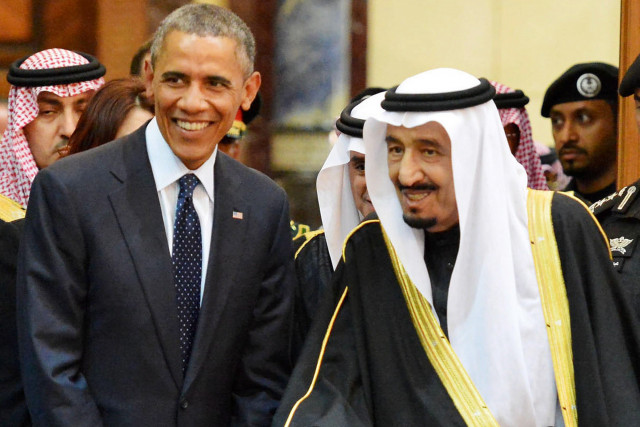Sovereign immunity at risk
There are codes and guiding principles that underpin international relationships

A handout picture provided by the Saudi Press Agency (SPA) shows US President, Barack Obama (L) and Saudi King, Salman bin Abdul Aziz (R), shortly after his arrival in Riyadh, Saudi Arabia, January 27, 2015. PHOTO: AFP
The White House has repeatedly expressed its opposition to the bill, and President Obama went to Saudi Arabia in a fence-mending exercise in April, presumably conscious of the possibility of the Bill going through the US Senate. Such a change to international law would render the US as well as every other sovereign state vulnerable — liable — to court systems everywhere and there is no shortage of states that would seek to avail themselves of the opportunity to seek to prosecute the US. Given the level of international engagement that it has, this is a level of exposure that could be disastrous to international relations. Americans working abroad would immediately be vulnerable, as would the national of any state working out-of-country in a state that was litigiously engaged with their home country. At the heart of the matter are 28 pages of unreleased material in the official report into the 9/11 attacks. These 28 pages remain classified and some commentators speculate that they implicate low-level representatives of the Saudi government; this being the reason why the Bill was proposed in the US Senate. Other commentators equally speculate that the Bill has little chance of ever making it on to the legislation books, as it now will have to pass through Congress but the fact is that for the first time there is the possibility of a challenge to sovereign immunity — and it may not be the last.
Published in The Express Tribune, May 20th, 2016.
Like Opinion & Editorial on Facebook, follow @ETOpEd on Twitter to receive all updates on all our daily pieces.















COMMENTS
Comments are moderated and generally will be posted if they are on-topic and not abusive.
For more information, please see our Comments FAQ